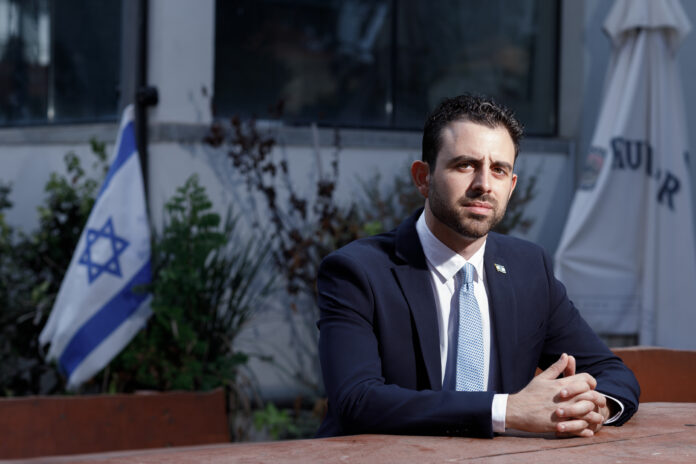Thank you so much for utilizing your precious time to speak with us. I know you’re one of the busiest people around these days. You seem to be fighting the hostile media almost single-handedly.
Not single-handedly. We have a good team—Mark Regev and Tal Heinrich are putting up a great fight—but sometimes it does feel like we’re standing up to the world on our own.
Everyone knows that the strategy of Hamas is to hide behind civilians and put Israel on the defensive with images of Palestinian casualties. Do you think they are winning the PR war?
Hamas is pursuing a despicable strategy that leaves Israel with few good options. Not only are they indifferent to their own civilian casualties, but in many cases they seek to maximize them. That’s because the images of their suffering are broadcast around the world, at which point Israel is immediately blamed despite its best efforts to prevent civilian casualties. We’ve seen how Israel is going above and beyond its obligations according to international law. The situation is so absurd that it’s difficult to tell the story without sounding like we’re making it up—because it’s so detached from the frame of reference people are used to. I’ll give you an example.
A few days ago, the army said that a terrorist leader was keeping 1,000 Palestinians as human shields in the Al-Rantisi hospital. We’ve been urging them to evacuate, because we want a clean battlefield without civilians so we can fight only against Hamas. So we killed the terrorist leader and facilitated the evacuation of civilians from the hospital, but then the Israeli troops came under attack as they were securing their safe passage. In other words, Hamas was holding its own people hostage, Israel had to kill the terrorists who were holding them and secure their safe passage, and then our soldiers were attacked with RPGs while they were trying to keep their civilians safe.
That reality is inconsistent with the story most people want to hear about the conflict and the one that most people are used to: That Israel doesn’t care about civilians, or even worse, that it actively wants to hurt them and is committing genocide—the horrific blood libel we’ve seen surfacing in recent weeks. No one in this country can understand how anyone can possibly fathom anything so completely stupid and monstrous. So it’s definitely a challenge.
You’ve been doing this for a while. Is there anything different about how the global media are currently portraying Israel than in the past?
First of all, I haven’t been doing this for a while. I joined the official team a week after the war started. When it first erupted I was an ordinary civilian. Then something extraordinary happened: The entirety of civil society mobilized to support the war effort. For some people, that meant distributing parcels of food to Holocaust survivors, while others have been volunteering in the agricultural sector because so many of the foreign workers have returned home. For me, in a very surprising twist, it meant accepting a call to serve as a spokesman for the national emergency wartime government. It has certainly been a baptism by fire. In the last month, I’ve done over 100 television and radio interviews.
What’s your background? I’m assuming they chose you because you have experience.
I was the international media adviser for President Herzog for almost the first two years of his presidency, working on his foreign media and English-language material. Before that, I was a news anchor for a long time both for Israel’s public broadcasting system and at i24 News, presenting the news in English. I moved to Israel from the UK in 2014 after completing my bachelor’s degree in philosophy, politics and economics at Oxford, and my master’s degree in international relations at Cambridge. One of the most useful trainings I’ve had for this position was being active on the university debating circuit many years ago. Competitive debating is an activity that forces you to think on your feet very quickly, to present arguments as powerfully and persuasively as you can, and to answer tough questions under pressure. That’s an instinct that has kicked into action with some of the fairly hostile interviews I’ve had.
To read more, subscribe to Ami





















